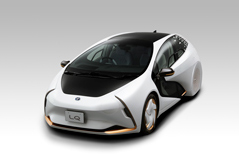
 Mumbai,27th February 2020 :- Lightweight materials will play an increasingly important role in future mobility, e.g. they will further extend the range of electric cars. Covestro as a provider of material solutions has a long-term experience in the global automotive industry. This also applies to the Japanese market, where the Innovation Center of Covestro has already developed many sustainable solutions, for instance components for low-density polyurethane foams.
Mumbai,27th February 2020 :- Lightweight materials will play an increasingly important role in future mobility, e.g. they will further extend the range of electric cars. Covestro as a provider of material solutions has a long-term experience in the global automotive industry. This also applies to the Japanese market, where the Innovation Center of Covestro has already developed many sustainable solutions, for instance components for low-density polyurethane foams. The kenaf fiber-reinforced polyurethane foam composite is characterized by a very low area density of less than 1 kg/m2 and high strength, making the door trim made of the fiber-reinforced kenaf polyurethane foam 30 percent lighter than that produced from conventional materials. The lighter the material, the further the car can travel on a single gas or battery charge.
The kenaf fiber-reinforced polyurethane foam composite is characterized by a very low area density of less than 1 kg/m2 and high strength, making the door trim made of the fiber-reinforced kenaf polyurethane foam 30 percent lighter than that produced from conventional materials. The lighter the material, the further the car can travel on a single gas or battery charge. About Covestro:With 2019 sales of EUR 12.4 billion, Covestro is among the world’s largest polymer companies. Business activities are focused on the manufacture of high-tech polymer materials and the development of innovative solutions for products used in many areas of daily life. The main segments served are the automotive, construction, wood processing and furniture, and electrical and electronics industries. Other sectors include sports and leisure, cosmetics, health and the chemical industry itself. Covestro has 30 production sites worldwide and employs approximately 17,200 people (calculated as full-time equivalents) at the end of 2019.
About Covestro:With 2019 sales of EUR 12.4 billion, Covestro is among the world’s largest polymer companies. Business activities are focused on the manufacture of high-tech polymer materials and the development of innovative solutions for products used in many areas of daily life. The main segments served are the automotive, construction, wood processing and furniture, and electrical and electronics industries. Other sectors include sports and leisure, cosmetics, health and the chemical industry itself. Covestro has 30 production sites worldwide and employs approximately 17,200 people (calculated as full-time equivalents) at the end of 2019.